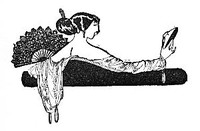The Hohenzollerns in America<br />With the Bolsheviks in Berlin and Other Impossibilities, Stephen Leacock [crime books to read txt] 📗

- Author: Stephen Leacock
Book online «The Hohenzollerns in America<br />With the Bolsheviks in Berlin and Other Impossibilities, Stephen Leacock [crime books to read txt] 📗». Author Stephen Leacock
Tom, to my surprise, refused a cocktail. It seems, as he explained, that he "got into the way of taking nothing over there." I noticed that my friend Quiller, who is a war correspondent, or, I should say, a war editorial writer, took three cocktails and talked all the more brilliantly for it through the opening courses of the dinner, about the story of the smashing of the Hindenburg line. He decided, after his second Burgundy, that it had been simply a case of sticking it out. I say "Burgundy" because we had substituted Burgundy, the sparkling kind, for champagne at our dinners as one of our little war economies.
Tom had nothing to say about the Hindenburg line. In fact, for the first half of the dinner he hardly spoke. I think he was worried about his left hand. There is a deep furrow across the back of it where a piece of shrapnel went through and there are two fingers that will hardly move at all. I could see that he was ashamed of its clumsiness and afraid that someone might notice it. So he kept silent. Professor Razzler did indeed ask him straight across the table what he thought about the final breaking of the Hindenburg line. But he asked it with that same fierce look from under his bushy eyebrows with which he used to ask Tom to define the path of a tangent, and Tom was rattled at once. He answered something about being afraid that he was not well posted, owing to there being so little chance over there to read the papers.
After that Professor Razzler and Mr. Quiller discussed for us, most energetically, the strategy of the Lorraine sector (Tom served there six months, but he never said so) and high explosives and the possibilities of aerial bombs. (Tom was "buried" by an aerial bomb but, of course, he didn't break in and mention it.)
But we did get him talking of the war at last, towards the end of the dinner; or rather, the girl sitting next to him did, and presently the rest of us found ourselves listening. The strange thing was that the girl was a mere slip of a thing, hardly as old as Tom himself. In fact, my wife was almost afraid she might be too young to ask to dinner: girls of that age, my wife tells me, have hardly sense enough to talk to men, and fail to interest them. This is a proposition which I think it better not to dispute.
But at any rate we presently realized that Tom was talking about his war experiences and the other talk about the table was gradually hushed into listening.
This, as nearly as I can set it down, is what he told us: That the French fellows picked up baseball in a way that is absolutely amazing; they were not much good, it seems, at the bat, at any rate not at first, but at running bases they were perfect marvels; some of the French made good pitchers, too; Tom knew a poilu who had lost his right arm who could pitch as good a ball with his left as any man on the American side; at the port where Tom first landed and where they trained for a month they had a dandy ball ground, a regular peach, a former parade ground of the French barracks. On being asked WHICH port it was, Tom said he couldn't remember; he thought it was either Boulogne or Bordeaux or Brest,—at any rate, it was one of those places on the English channel. The ball ground they had behind the trenches was not so good; it was too much cut up by long range shells. But the ball ground at the base hospital (where Tom was sent for his second wound) was an A1 ground. The French doctors, it appears, were perfectly rotten at baseball, not a bit like the soldiers. Tom wonders that they kept them. Tom says that baseball had been tried among the German prisoners, but they are perfect dubs. He doubts whether the Germans will ever be able to play ball. They lack the national spirit. On the other hand, Tom thinks that the English will play a great game when they really get into it. He had two weeks' leave in London and went to see the game that King George was at, and says that the King, if they will let him, will make the greatest rooter of the whole bunch.
Such was Tom's war talk.
It grieved me to note that as the men sat smoking their cigars and drinking liqueur whiskey (we have cut out port at our house till the final peace is signed) Tom seemed to have subsided into being only a boy again, a first-year college boy among his seniors. They spoke to him in quite a patronising way, and even asked him two or three direct questions about fighting in the trenches, and wounds and the dead men in No Man's Land and the other horrors that the civilian mind hankers to hear about. Perhaps they thought, from the boy's talk, that he had seen nothing. If so, they were mistaken. For about three minutes, not more, Tom gave them what was coming to them. He told them, for example, why he trained his "fellows" to drive the bayonet through the stomach and not through the head, that the bayonet driven through the face or skull sticks and,—but there is no need to recite it here. Any of the boys like Tom can tell it all to you, only they don't want to and don't care to.
They've got past it.
But I noticed that as the boy talked,—quietly and reluctantly enough,—the older men fell silent and looked into his face with the realisation that behind his simple talk and quiet manner lay an inward vision of grim and awful realities that no words could picture.
I think that they were glad when we joined the ladies again and when Tom talked of the amateur vaudeville show that his company had got up behind the trenches.
Later on, when the other guests were telephoning for their motors and calling up taxis, Tom said he'd walk to his hotel; it was only a mile and the light rain that was falling would do him, he said, no harm at all. So he trudged off, refusing a lift.
Oh, no, I don't think we need to worry about the returned soldier. Only let him return, that's all. When he does, he's a better man than we are, Gunga Dinn.
2.—The War Sacrifices of Mr. Spugg
Although we had been members of the same club for years, I only knew Mr. Spugg by sight until one afternoon when I heard him saying that he intended to send his chauffeur to the war.
It was said quite quietly,—no bombast or boasting about it. Mr. Spugg was standing among a little group of listening members of the club and when he said that he had decided to send his chauffeur, he spoke with a kind of simple earnestness, a determination that marks the character of the man.
"Yes," he said, "we need all the man power we can command. This thing has come to a showdown and we've got to recognise it. I told Henry that it's a showdown and that he's to get ready and start right away."
"Well, Spugg," said one of the members "you're certainly setting us a fine example."
"What else can a man do?" said Mr. Spugg.





Comments (0)